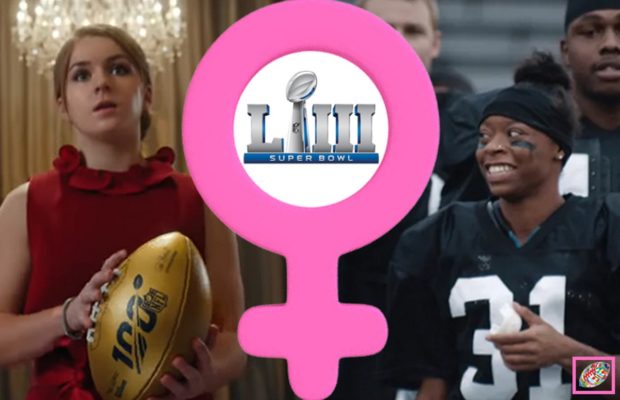Women’s football arrives at Super Bowl LIII

The New England Patriot’s 13-3 victory over the Los Angeles Rams in Super Bowl LIII may have not have kept viewers entertained, but those who tuned in for the commercials saw something different – a number of advertisements featuring girls and women playing the game.
Last year, during the festivities around Super Bowl LII, Samantha Gordon received the inaugural NFL Game Changer award for being the public face of the Utah Girl’s Football League. Gordon’s path to the award began when her father posted videos of his daughter playing youth football and running around her male competitors. Brent Gordon and Crystal Sacco capitalized on the excitement generated by the videos to organize the UGFL, which in 2018 had perhaps four hundred girls playing full contact football.
Gordon was back for Super Bowl LIII, but this time in one of the more entertaining commercials of the night. The advertisement celebrated the 100th season of the National Football League. In the midst of a fairly dull speech by NFL Commissioner Roger Goodell, Marshawn Lynch knocks over an elaborately decorated cake with a golden football on top. When the ball hit the floor, instinct took over and the players began running, passing, and tackling. When the ball is dislodged into the air, it landed in Gordon’s hands. Richard Sherman (SF 49ers) smilingly asked her for the ball, to which Gordon replied “You want this? Come and get it!” She then did a spin move around Sherman and pitched the ball to Saquon Barkley (NY Giants). According to Brent Gordon in an interview with the Salt Lake City Tribune, the point of the commercial’s ending was to “show a century of NFL history, pivoting to the end to ‘What’s the future going to be like? It’s Sam pitching the ball to the rookie, Saquon Barkley.’”
The future was also the subject of another commercial, this one for Toyota that featured Antoinette “Toni” Harris. Over scenes of Harris working out and using one of their vehicles, the narrator informed viewers that “They’ve said a lot of things about Toni Harris. They said she was too small. They said she was too slow. Too weak. They said she’d never get to the next level. Never inspire the next generation. Never get a football scholarship. Yeah. People have made a lot of assumptions about Toni.” The advertisement shifted to Harris, who played defensive back for East Los Angeles College, and who has recently accepted a scholarship offer to play at Bethany (Kansas) College, driving their vehicle and saying “But I’ve never been a big fan of assumptions.”
The final commercial of the evening was a CBS public service announcement for Girls Inc. that depicted a team of young girls lined up against a team of New York Giants players. They run a trick play and eventually score. The narrator told viewers that “When girl’s face their challenges, they’re stronger. When girls work together they realize their value. When girls get to play, they learn to win.” Then the team, with their feet planted on their grounded helmets, shouting “Girl Power!” with the organization’s logo and the motto “Inspiring all girls to be strong, smart, and bold.”
The commercials were not the only place where women football players were featured at the big game. Phoebe Schecter, who played in Britain for the Birmingham Lions and the UK National Team, and who, in 2018, had a season long coaching internship with the Buffalo Bills, was also featured in the official program for the Super Bowl. The article, titled “Foreign Investments,” featured international players in the league, and Schecter.
In addition, before the game, Patriot’s wide receiver and eventual Most Valuable Player for the game Julian Edelman surprised Dejah Rondeau, a seventh grade girl who played quarterback wearing Edelman’s number 11 with tickets for the Super Bowl. After their victory over the Chiefs to earn their spot in the championship game, Patriot’s owner invited Rondeau to the team’s facility, and Edelman not only played catch with her, but also gave her the tickets.
The exposure of girls and women playing the game is noteworthy. As was the NFL Films recent profile of Nausicaa Dell’Orto. But does this mean that the NFL might recognize women’s football with more than the occasional mention? Might they sponsor teams or leagues, as Robert Kraft does in Israel? That does not seem likely. The commercials and the other placements featured girls and women doing something out of the ordinary. They were playing against the men, or coaching them. There was no mention of the thousands of women who play in the various semi-professional leagues in the United States and abroad.
These athletes would also like some recognition.